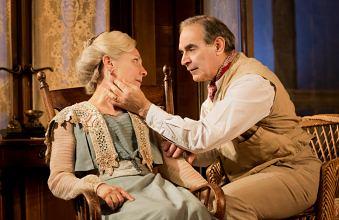Long Day's Journey into Night Apollo Theatre 2012
Seeing this play by the award-winning American playwright Eugene O'Neill is unsettling on two counts. First, the subject matter is intimately connected with the writer's own family life, and is somewhat harrowing. And, second, there is doubt about whether the author ever intended for his play to be performed, for he stated so explicitly to his publishers and, furthermore, only wanted it published 25 years after his death. However, after he died in 1953, his wife gave permission for the play to be published and it was first performed in the same year (1956). She apparently argued that it was her husband's death-bed wish. Though his wife's decision has given us a remarkable drama, it still leaves one wondering whether the author's intentions were really followed.
As the title suggests, the action takes place in just one day in the summer cottage of the Tyrone family in 1912. Gathered there are James Tyrone, his wife Mary and their grown-up sons James and Edmund (the younger of the two). Father James is an actor who became rich when he acquired the rights to a play which turned out to be hugely popular and enabled him to earn a small fortune, even if his career suffered from typecasting. Wife Mary has just returned from receiving treatment in a sanatorium for addiction to morphine brought on, she claims, by the fact that she was prescribed it by a 'cheap' doctor after she gave birth to Edmund. Although the family hope that she is cured, Mary thinks the men are 'spying' on her, and her addiction grips her again. At the same time, Edmund's cough proves to be more than a mere 'summer cold', and he is diagnosed as having consumption, requiring lengthy treatment in hospital.
Lez Brotherston's beautifully detailed set leaves us with a sense of second league comfort - wood covers the ceiling and most of the walls, but it's not the kind of wood panelling that suggests opulence or real wealth. And that fits well with Tyrone's penny-pinching ('close-fisted') approach to life, and Mary's comments about the state of the house, and it not being a 'home'.
David Suchet as the head of the household, did not entirely convince me of his stature as a classical actor of the early twentieth century. But maybe the idea is to show that his view of his own acting abilities doesn't fit exactly with reality. Nonetheless, Mr Suchet's performance is powerful and meticulous, as one might expect, contrasting the confidence of an actor with a deep-rooted fear of poverty which forces him to buy second-hand cars, choose 'cheap' doctors, buy dodgy property and switch off lights to save money on electricity in spite of being well-off.
Kyle Soller follows-up his well-deserved, meteoric rise to fame gained with several key roles at the Young Vic and the Royal Court in 2011, as younger son, Edmund. Mr Soller has the unenviable task of, for the most part at least, coughing his way through the play to demonstrate signs of consumption. Mr Soller's Edmund is intelligently energetic in spite of his medical condition, displaying a poetic and artistic view of life, yet with the emotion and confidence to take on his father - especially when he is drunk. Trevor White also proves enormously compelling with a studied interpretation of elder son, James. In spite of his father's claims that he is a wastrel who sponges off his father most of the time, he shows clarity of vision in recognising his mother's decline.
In spite of all of those highly-skilled qualities on display from the rest of the cast, they are almost eclipsed by Laurie Metcalf's mesmerising performance as Mary. From the start, Ms Metcalf clearly shows the direction in which Mary is heading, yet achieves that effect gradually keeping us guessing about her state of mind and health, at least for a while. As she succumbs to the effects of morphine, she quite literally drifts away from reality and her family, chattering almost uncontrollably at one point and becoming, in the end, merely a child-like ghost.
Anthony Page's sympathetic and prudent direction keeps the running time in check at just about 3 hours. But even then the time speeds by in what is an absorbing, if unsettling experience. Autobiographical and apparently requiring 'tears and blood' to bring it to the page, Eugene O'Neill's play strikes chords for many people who see their own disappointments, fears and torments reflected in the work, which of course makes it all the more difficult to watch, even if it is a very fine revival of an extraordinary play.
(Peter Brown)
"Fine revival, which boasts glowing performances by David Suchet and Laurie Metcalf...what also grips us is the tension between O'Neill's tight classical structure and the surging contradictions of family life."
Michael Billington for The Guardian
"Anyone who admires great acting will savour the performances of David Suchet and Laurie Metcalf in this potent revival of Eugene O'Neill's shattering tragedy."
Henry Hitchings for the Evening Standard
"Superb...wonderfully acted...This is a masterly production of a masterpiece. It isn't easy to sit through, but the dramatic rewards are enormous. "
Charles Spencer for the Daily Telegraph
External links to full reviews from popular press
The Guardian - Telegraph
Originally published on
